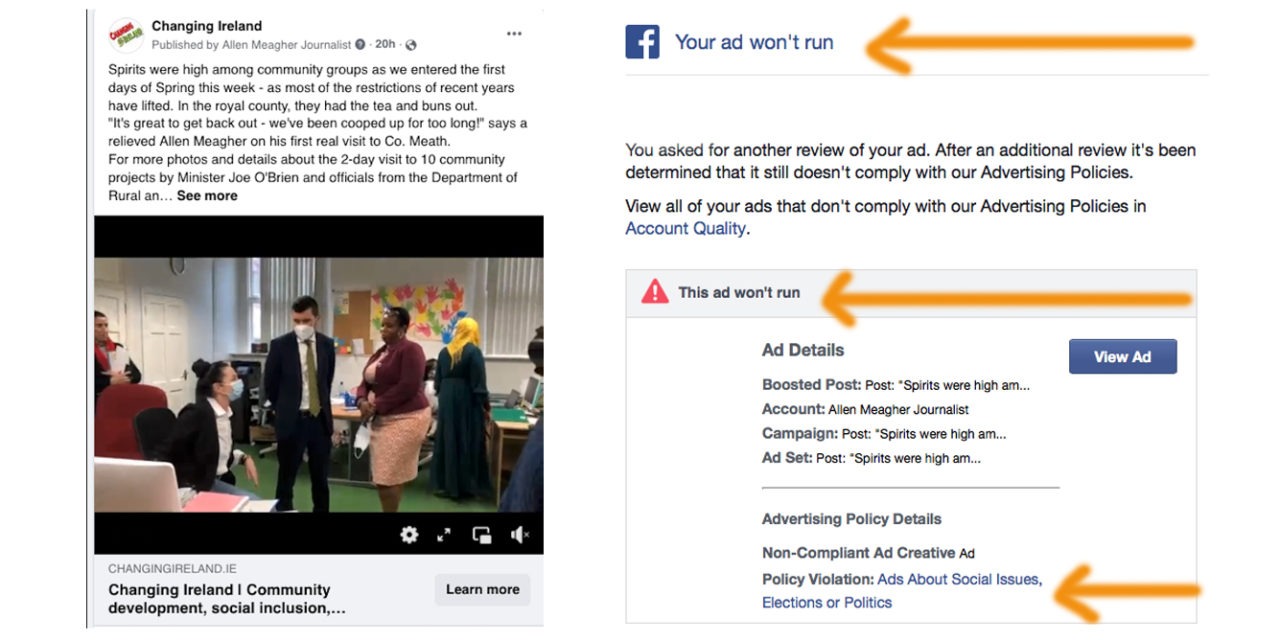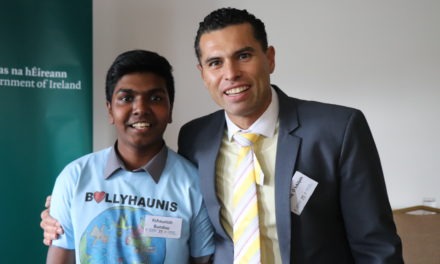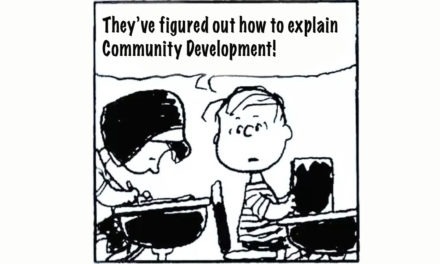Facebook is suppressing video news about community groups who engage in anti-racism work and who support vulnerable young people and older people, unemployment people, migrants and Travellers.
The same organisation that claims to take online hate seriously is blocking inoffensive news about grassroots organisations who are busy tackling discrimination and hate on the ground.
This is certainly the case based on our experience.
Facebook (now called Meta) relies chiefly on artificial intelligence to govern who sees what (rather than investing more in humans to adjudicate). This could adversely affect civil society groups.
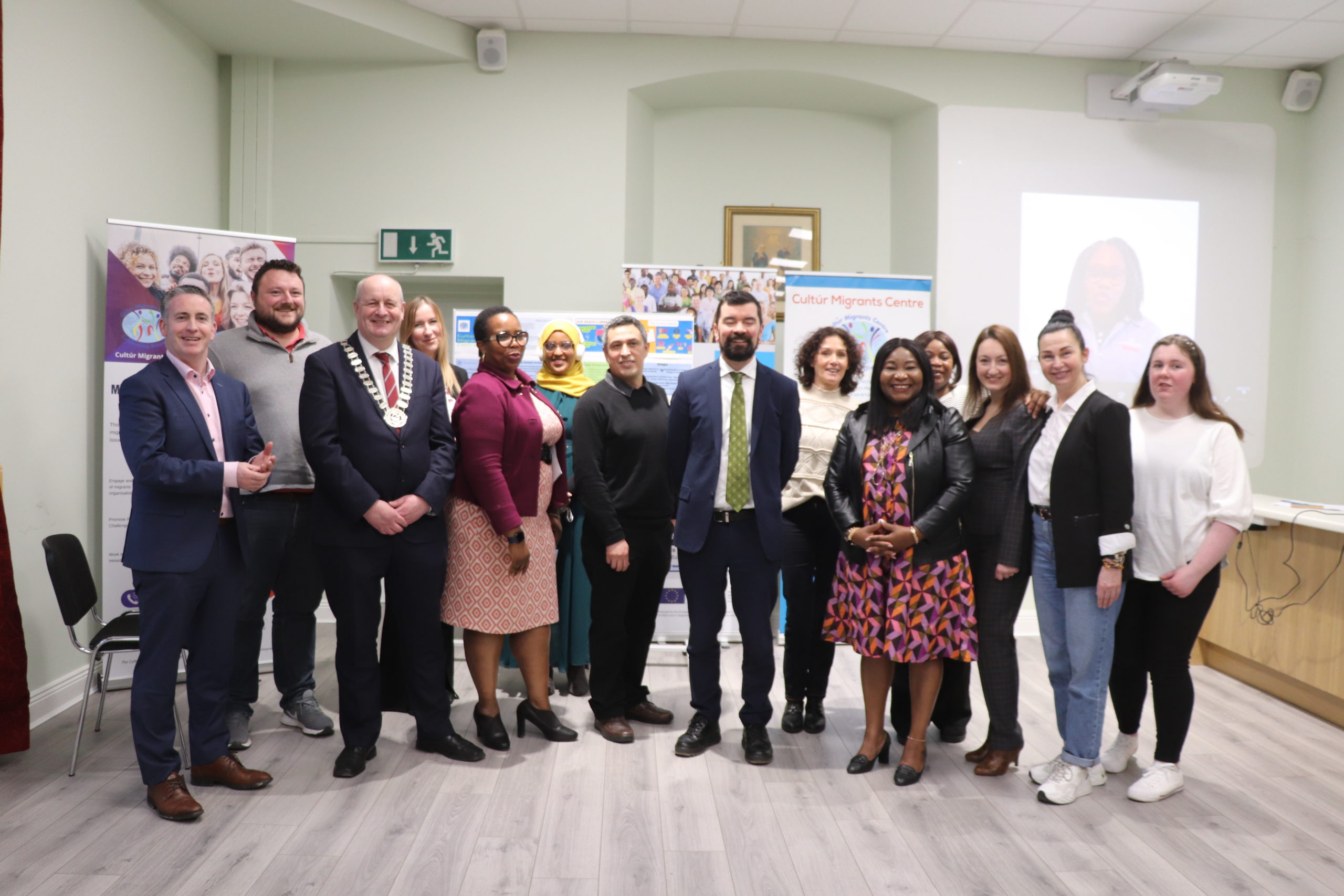
• ABOVE: Cultúr in Navan provides English language and other supports to migrants, asylum seekers and refugees. The project is run entirely by migrants themselves and is supported through the Social Inclusion and Community Activation Programme. Cultúr was one of seven organisations chosen last year to be part of the €1m Community Development Pilot Programme.
Last week, ‘Changing Ireland’ spent 9 hours visiting 10 fantastic community groups in Co. Meath, spread over two days. Outside of print, how do you best summarise that? In photos, text and video, shared with your online audience.
We chose clips from the hours of talks, chat and touring and shrunk the visits to 1min 17secs. This was for immediate broadcast and thankfully, like other publications, we have thousands of social media followers.
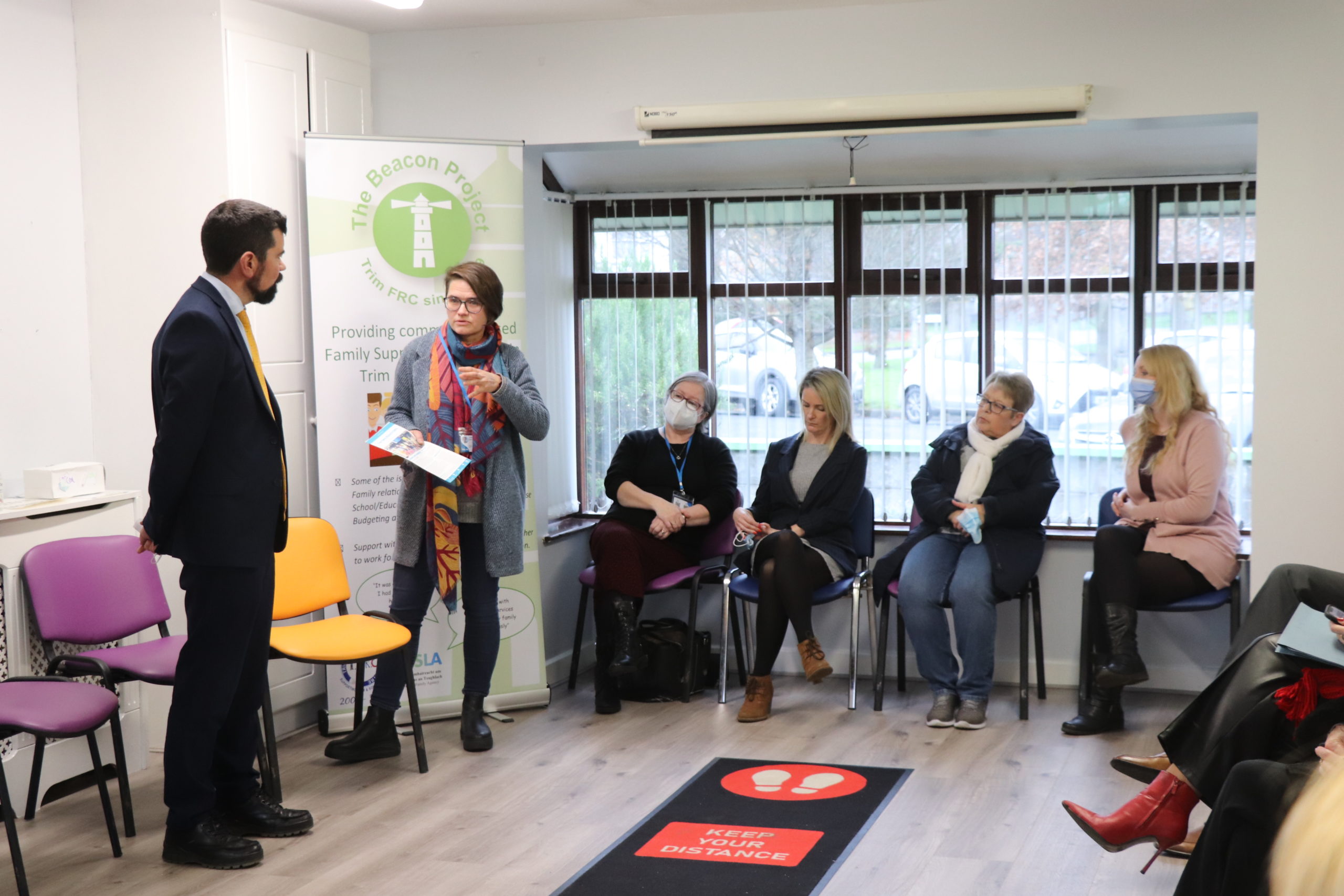
• ABOVE: Around 25 people gathered on Tuesday, Feb 1st, in Trim Family Resource Centre (FRC) to welcome Minister Joe O’Brien. The FRC is a locally based family support and community development project that empowers families and the community to identify their own needs and explore solutions to best address these. They called for more support from government.
Paying for a Facebook “boost”
Most of our content is positive, grassroots journalism, often including critical insights from people who know the issues through living with them and seeking solutions.
However, we know the social media companies’ algorithms are stacked against us. They are in the business of making money.
It’s no secret they do this to encourage you to spend money to promote your posts (in this case community news from Co. Meath).
Occasionally, we view a good news story as worth the payment for a Facebook “boost”.
This was one of those times; social activities in Ireland are just getting back to near normal after Covid and the community groups we met epitomised the energy, enthusiasm and optimism at grassroots level nationwide.
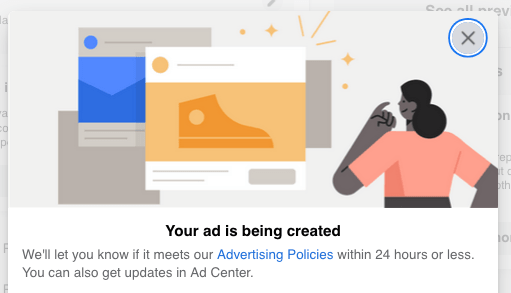
But Facebook have changed the rules.
What happened when we went to pay?
We paid €12 to Facebook on the promise of thousands of views (we have 1,958 followers, but FB had suppressed views so only 13 people saw the video). Well, I thought – Facebook does rule the roost, but at least money talks.
However, unlike all previous times, the “boost” was surprisingly rejected. I “appealed” as Facebook call it and this too was rejected (by an AI judge). The rejection email was headed “Your ad won’t run” and it further emphasised “This ad won’t run” beside a traffic alert sign.
The proposed boost was a “policy violation” because it was “about social issues, elections or politics.”
After appealing, there was nowhere left to go.*
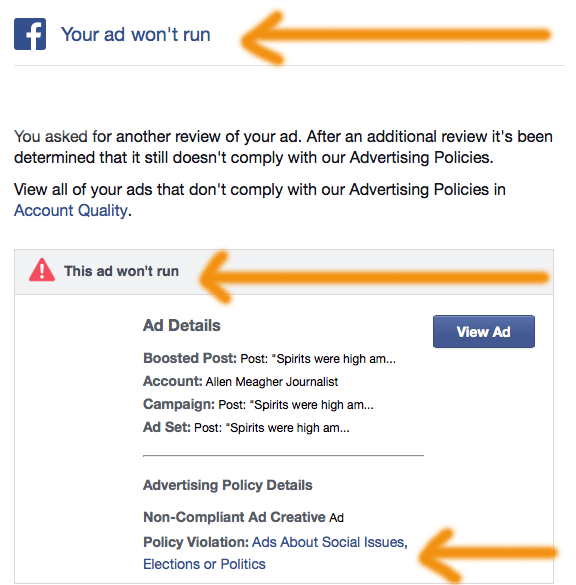
What was in the video that was so bad?
People in the video are heard talking about family wellbeing, about “mental health”, “representing migrants”, “success” and “solutions”. Most of the audio is overlaid with music. It was a cheery, volunteer-focused video to lift people’s spirits.
Is this so awful?
Perhaps I tripped up by referring in an earlier related post to volunteers and “activists”.
Who knows the mind of an AI programme?
About the visit
The occasion was the visit by a minister – in this case the Minister of State for Rural and Community Development, Joe O’Brien. He was accompanied by locally-based Minister of State at the Department of Enterprise, Trade and Employment, Damien English.
Visiting Trim Family Resource Cente, Minister O’Brien is heard in the video saying, “It’s an impressive operation for sure here.”
And that’s all you hear in the video from the ministers.
What’s so special that’s happening in Co. Meath?
Ministers O’Brien and English listened to criticisms and helpful suggestions to improve the government’s delivery of support to marginalised people and to the community groups that seek to empower those very people.
- They visited a volunteer-led group (SoSad in Navan) and heard directly from people who received treatment for depression and who told us of friends dying by suicide who may not have died if they had known more about the very services everyone present is determined to promote.
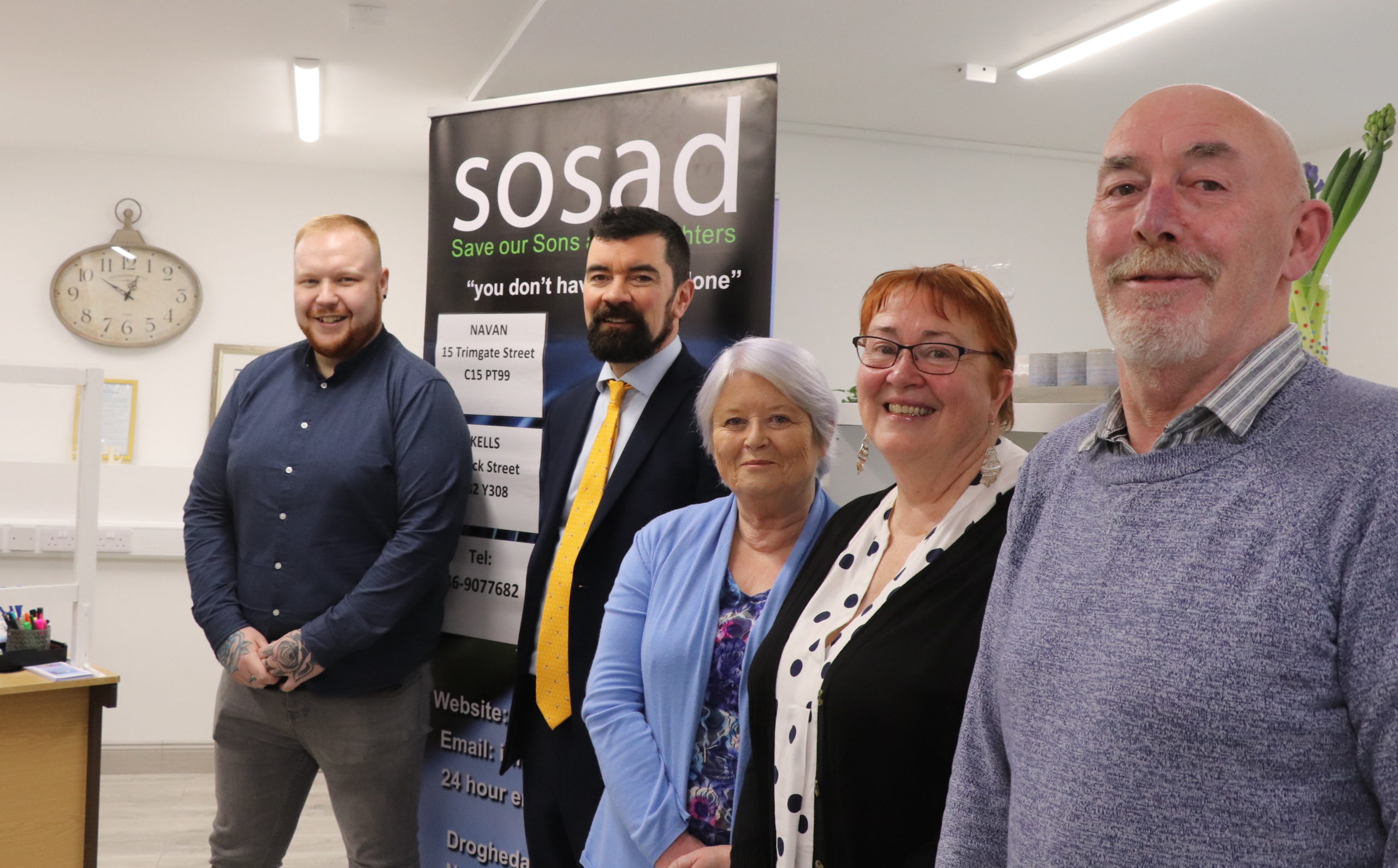
• ABOVE: Lee MacMalidhe, volunteer, Marie Johnston, co-ordinator of SoSad Meath, Carol Murphy, general mgr of SoSad Ireland, and William ‘Handsome’ Johnston, volunteer.
- They heard from Tus supervisors saying one year placements were not long enough. The Rural Social Scheme is nowhere near as good as it was when first launched in 2004 – it has drifted from the original idea to give small-time farmers an extra source of income while their valuable services are utilised for community good.
- They met a dozen schoolchildren who once had a difficult, near-2 hour walk to and from school, encountering many obstacles along the way. They now have a bus service (even though they don’t live in a rural area and therefore didn’t qualify for the Dept of Education’s bus). The bus they travel on is part-funded through the Social Inclusion and Community Development Programme and attendance has shot up to 95%.
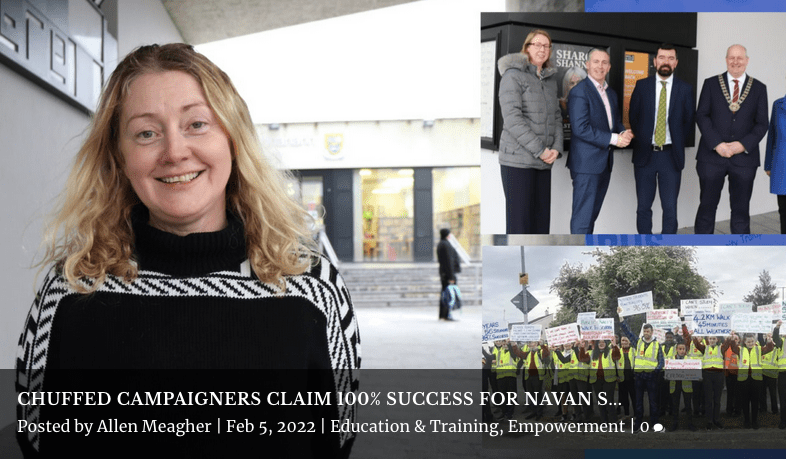
• READ THE FULL STORY HERE: Chuffed campaigners claim 100% success for Navan schoolbus.
- The ministers and his officials met a man with a helicopter in the field behind his house. After becoming unemployed, Capt. Aidan Garvey dreamed of a setting up a small business and with support from the Back to Work Enterprise Allowance Scheme he has established a helicopter training school.
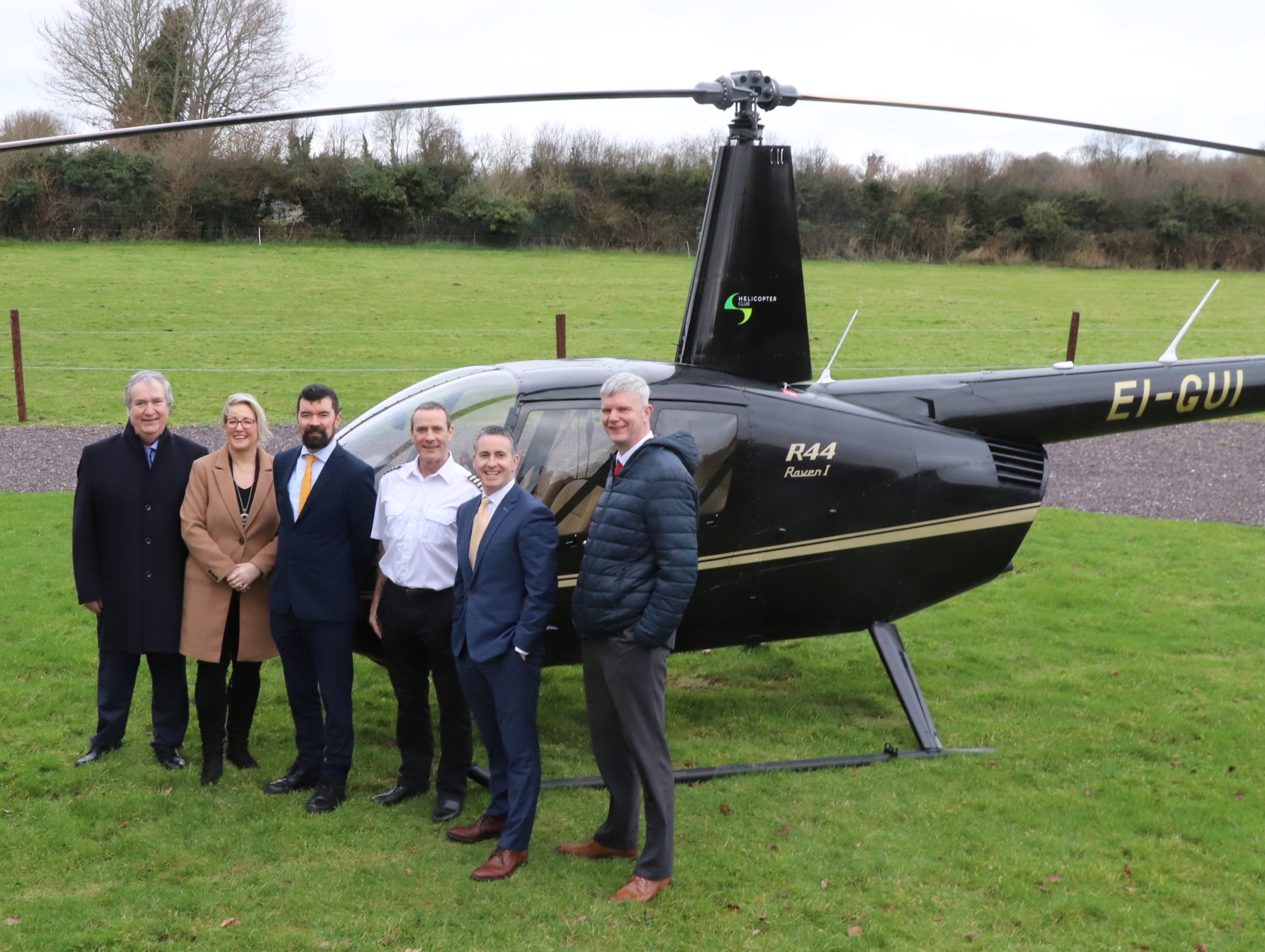
• FLYING HIGH WITH THE BACK TO WORK EDUCATION ALLOWANCE: Meath Partnership staff – Michael Ludlow, CEO and colleague (name to follow), Ministers of State Joe O’Brien and Damien English, Capt. Aidan Garvey (centre) and Paul Geraghty, principal officer, Dept. of Rural and Community Development.
- They heard people ask for a re-opening of the highly-regarded Community Services Programme – and that may well happen later this year, people were told.
And that’s just to mention half the projects visited.
Ministers’ visits are genuinely important
Visits such as these bring everyone together, something that’s more importance than ever after two years in a pandemic. They help to highlight the work by fabulous collectives led by volunteers. They shine a light on issues that marginalised people face and the solutions they identify and politicians value listening to people on the ground.
Communities welcome attention and encouragement
In Ireland, the role of senior politicians visiting community groups is an important one. They go to listen and to focus public attention on a group’s reason for existence and on their often life-changing if not vital work. While celebrities often get behind an issue, ministers and public representatives willingly get behind whole communities.
Promotion of these good news events is an essential component of these visits.
Judge for yourself! Here is the offending video:
https://www.facebook.com/changingirelandmedia/videos/428328915699640/?t=2
And this is the full-length Youtube version – 2mins 17secs:
Great to see community work first-hand
For example, speaking about his Meath visit, Minister O’Brien said it was “great to see first-hand” the work that communities are carrying out with support from the Departments of Rural and Community Development and Social Protection, among others.
“One job of Government is to support communities so that they can develop to become vibrant and inclusive,” he said. All the projects showed “the resourcefulness of local communities in identifying an issue and developing a plan to address it and enhance all aspects of the community.”
Community development is the antithesis to fascism
There were no controversial campaigns covered in the video report. It was generally about community development – the antithesis to fascism, to racism, to homophobia, to inequality, and to rampant consumerism. Community development is not about elections. It is about empowering people from the bottom-up through collective action. It encourages people to identify solutions to the challenges facing their communities and to seek social change.
Monolith’s monstrous footprint
We are tiny, but our message is important. However, Facebook has a near monopoly on who gets their message heard and if the company’s AI cannot adjudicate on content, clearly the company should employ more human beings (and pay them properly) to carry out reviews.
Facebook is a monolith and researchers have shown how it profits while undermining democracy. A monolith is defined as “a large powerful organisation that… does not consider the ideas or feelings of the people it affects”.
What is ‘Changing Ireland’?
While our publication is called ‘Changing Ireland’, it is the paid civil society and public service workers, volunteers and activists who are seeking to change Ireland. Our focus is on reporting how such groups fight injustice, discrimination and inequality to change society for the better, one community at a time, often in very effective ways. Community development is an inclusive and often slow process. It happens on the ground, behind the scenes, while crime, violence or hate receives the bulk of media and public attention.
Facebook is not a fickle business
If we were in the US and advertising a suppressor for a gun (I’ve read about them after US mass shootings) I’m sure Facebook would have no problem taking our money. Instead, we’re suppressed. The social media giant encourages you to pay, then is too stingy to employ enough humans to review paid posts when a non-profiit such as ours wants to pay.
Posting on Facebook and other social media platforms isn’t a fickle business – it’s pure business. But when they suppress the very people trying to combat the kind of hate that Facebook leaned on for super-profiteering, you wonder which way to go.
* If you dig, you’ll unearth links leading to a convoluted-looking, third appeal process. If anyone has explored this, I’m all ears. We also plan to recruit a social media specialist shortly.
Postscript – a previous encounter
‘Changing Ireland’ has a history with Facebook. I suspect it sent a representative to sit quietly in court and take notes during a landmark three-hour case involving us that was heard in Killarney, in 2011. Community workers and many others had been outraged to find hate pages with tens of thousands of followers on Facebook’s platform calling for Travellers to be shot and burned. The case was brought by brave community workers and determined Gardai based on evidence shared with community groups by this publication.
The case marked the first time in Ireland that anyone was prosecuted for hate-crime online. The accused admitted his guilt in court, but was given “a second chance” by the judge and was let go without conviction. Those who brought the case were disappointed as a conviction would have sent out a strong message.
Afterwards, despite the fact that three others creators of the Traveller hate-sites were identified, no further arrests were made or cases taken by the DPP, no doubt to Facebook’s relief. The company should arguably have also been in the dock that day, but the law has yet to evolve while campaigners continue to call for stronger hate-crime laws including for online content.
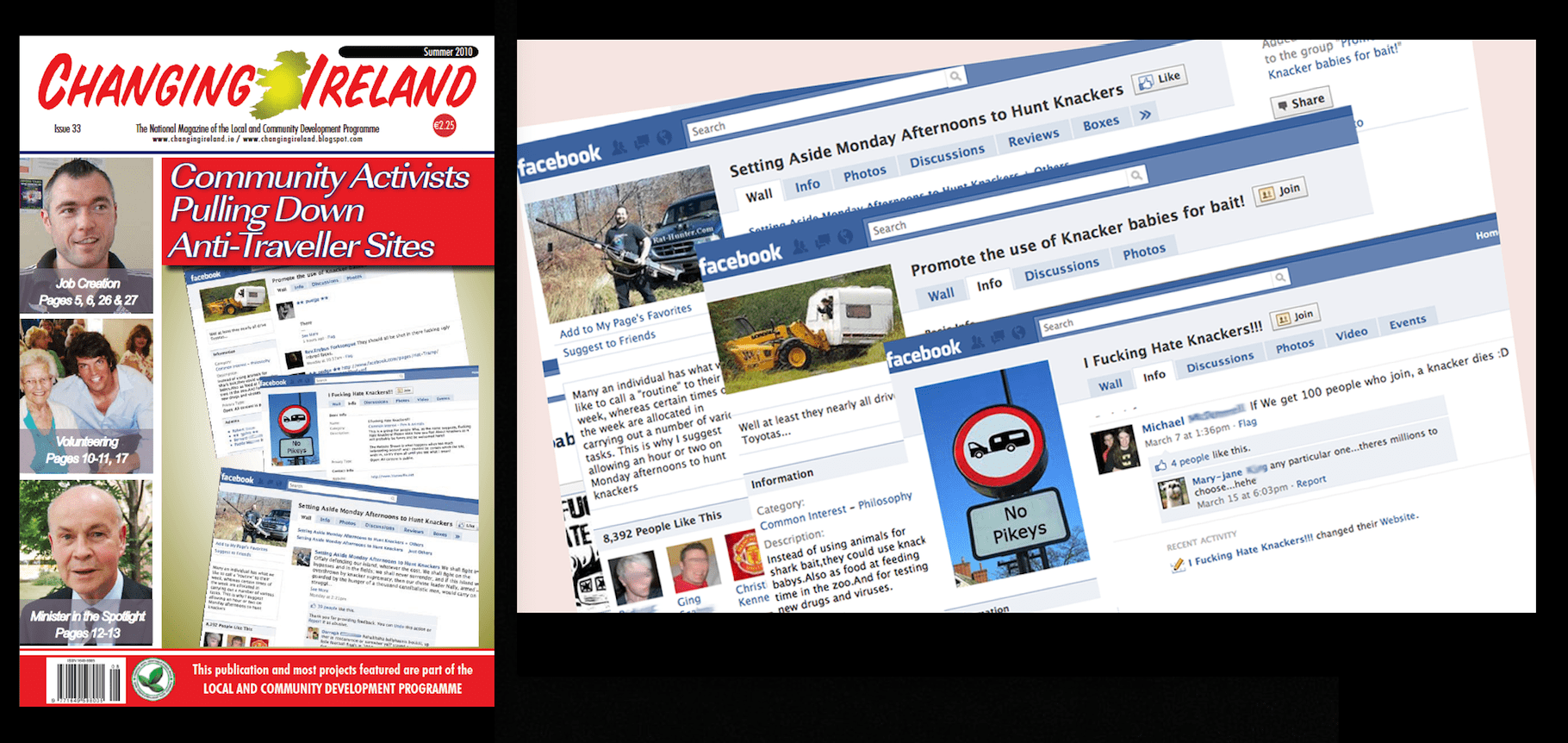
REF: ‘File gone to DPP Over Facebook’s Anti-Traveller Sites’ – https://www.changingireland.ie/file-gone-to-dpp-over-facebooks-anti-traveller-sites/ and (on page 27 in Issue 37 from our archive) a short court report with reaction: https://www.changingireland.ie/wp-content/uploads/2019/09/Issue-37-36p-BUMPER-EDITION-Winter-2011.pdf
Also: ‘Man cleared of online hatred of Travellers’ – https://www.irishexaminer.com/news/arid-20169325.html
For Reference:
Recent news reports on Facebook algorithms and what gets suppressed:
– ‘A high-level look at what gets suppressed by Facebook’s algorithm’:
– ‘Palestinians raise alarm over Facebook content ‘suppression”:
– ‘Facebook Reveals What Content It Will Suppress, But Not Remove — Though Crucial Details Remain Hidden’:

